-
 Bitcoin
Bitcoin $107,490.3555
0.12% -
 Ethereum
Ethereum $2,429.0242
-0.68% -
 Tether USDt
Tether USDt $1.0003
-0.01% -
 XRP
XRP $2.1909
4.62% -
 BNB
BNB $647.0228
0.21% -
 Solana
Solana $145.4573
2.77% -
 USDC
USDC $0.9998
0.00% -
 TRON
TRON $0.2743
1.11% -
 Dogecoin
Dogecoin $0.1629
0.78% -
 Cardano
Cardano $0.5639
1.17% -
 Hyperliquid
Hyperliquid $36.8090
0.45% -
 Bitcoin Cash
Bitcoin Cash $498.6939
-0.90% -
 Sui
Sui $2.7064
2.60% -
 Chainlink
Chainlink $13.1161
0.01% -
 UNUS SED LEO
UNUS SED LEO $9.0785
0.73% -
 Stellar
Stellar $0.2383
1.62% -
 Avalanche
Avalanche $17.6030
0.75% -
 Toncoin
Toncoin $2.8449
0.32% -
 Shiba Inu
Shiba Inu $0.0...01137
1.06% -
 Litecoin
Litecoin $85.4672
0.49% -
 Hedera
Hedera $0.1473
2.72% -
 Monero
Monero $314.3940
1.03% -
 Bitget Token
Bitget Token $4.7116
0.51% -
 Dai
Dai $1.0001
0.02% -
 Polkadot
Polkadot $3.3462
1.11% -
 Ethena USDe
Ethena USDe $1.0004
0.04% -
 Uniswap
Uniswap $6.9306
0.38% -
 Pi
Pi $0.5343
-2.80% -
 Pepe
Pepe $0.0...09292
0.33% -
 Aave
Aave $255.4154
-0.75%
How to safely create a Bitcoin wallet address
Bitcoin wallets store private keys, not Bitcoin; addresses are public for receiving funds, while private keys must be kept secret to prevent permanent loss of access.
Mar 30, 2025 at 11:14 pm
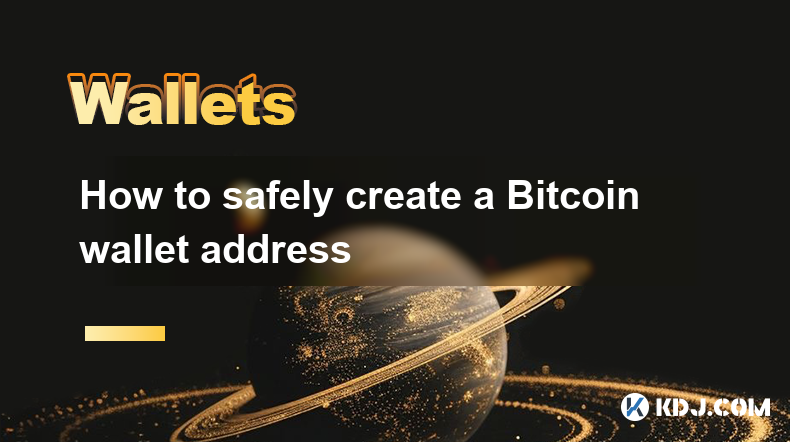
Understanding Bitcoin Wallet Addresses
A Bitcoin wallet doesn't actually store your Bitcoin. Instead, it stores your private keys, which are cryptographic codes that grant you access to your Bitcoin. Your Bitcoin wallet address, on the other hand, is a publicly visible string of characters that others can use to send you Bitcoin. Think of it like your bank account number – you give it to people to receive money, but your private key is like your PIN, which you must keep secret. Losing your private key means losing access to your Bitcoin permanently.
Choosing the Right Type of Bitcoin Wallet
Several types of Bitcoin wallets exist, each with its own security implications. The choice depends on your technical skills and security needs.
Software wallets: These are applications installed on your computer or mobile device. They offer varying levels of security depending on the specific software and its features. Popular options include Electrum and Exodus. Remember to download only from official sources to avoid malware.
Hardware wallets: These are physical devices that store your private keys offline. They are generally considered the most secure option, as they protect your keys from malware and online attacks. Examples include Ledger and Trezor. Always verify the authenticity of your hardware wallet before use.
Web wallets: These are online services that manage your Bitcoin for you. They are convenient but generally less secure than software or hardware wallets because they are accessible through the internet. Only use reputable web wallets with strong security features and a good track record.
Paper wallets: These involve printing your public and private keys on paper. While offering excellent security when stored properly, they are less convenient for regular transactions. Store your paper wallet in a safe, secure location, away from moisture and damage.
Step-by-Step Guide to Creating a Bitcoin Wallet Address (Software Wallet Example)
This example uses a hypothetical software wallet. The specific steps may vary depending on the wallet you choose. Always consult the official documentation of your chosen wallet.
Download and Install: Download the software wallet from the official website. Verify the authenticity of the download using checksums or other verification methods provided by the developer.
Create a New Wallet: Launch the software and follow the on-screen instructions to create a new wallet. You will likely be asked to create a strong password. Choose a strong, unique password that you won't forget. Use a password manager if needed.
Backup Your Seed Phrase: The software will generate a seed phrase (a list of words). This is crucial! Write down your seed phrase on paper and store it in a safe, secure location. Never store it digitally. Losing your seed phrase means losing access to your Bitcoin.
Receive Your Wallet Address: Once the wallet is set up, you'll see your Bitcoin wallet address. This is the address you'll give to others to send you Bitcoin.
Verify Your Address: Before using the address, double-check that it's correct. A single wrong character can result in lost funds.
Security Best Practices for Your Bitcoin Wallet
Strong Passwords: Use strong, unique passwords for all your wallets and accounts.
Regular Software Updates: Keep your software wallets updated to the latest version to benefit from security patches.
Antivirus Software: Use reputable antivirus software on your computer to protect against malware.
Two-Factor Authentication (2FA): Enable 2FA whenever available to add an extra layer of security.
Offline Storage: For long-term storage, consider using a hardware wallet or paper wallet to keep your private keys offline.
Multiple Wallets: Consider using multiple wallets to separate funds for different purposes.
Understanding Private Keys and Public Keys
Your Bitcoin wallet holds two crucial cryptographic keys:
Private Key: This is a secret code that proves your ownership of the Bitcoin. Never share your private key with anyone.
Public Key: This is derived from your private key and is used to generate your Bitcoin address. It's safe to share your public key (your Bitcoin address).
What if I lose my private key?
If you lose your private key, you lose access to your Bitcoin. There is no recovery process. The importance of securely backing up your seed phrase cannot be overstated.
Frequently Asked Questions
Q: Is it safe to use a web wallet?
A: Web wallets are convenient but generally less secure than software or hardware wallets due to their online nature. Use only reputable web wallets with strong security features.
Q: What is a seed phrase?
A: A seed phrase is a list of words that acts as a backup for your private keys. It's crucial to write it down securely and keep it safe.
Q: How do I choose a secure Bitcoin wallet?
A: Consider your technical skills and security needs. Hardware wallets are generally the most secure, while software wallets offer a balance of security and convenience. Web wallets are the least secure option.
Q: What should I do if I suspect my wallet has been compromised?
A: Immediately change your passwords, secure your seed phrase, and contact the wallet provider's support if applicable. Monitor your transactions closely.
Q: Can I recover my Bitcoin if I lose my wallet?
A: If you lose your private key or seed phrase, you cannot recover your Bitcoin. This highlights the importance of securely storing your backup.
Q: Are all Bitcoin wallets the same?
A: No, Bitcoin wallets vary significantly in their security features, user interfaces, and functionality. Research different options before choosing one.
Q: How often should I back up my wallet?
A: Back up your wallet immediately after creating it and regularly thereafter. The frequency depends on how often you use your wallet and how much Bitcoin you hold. Consider backing up your seed phrase at least once a month.
Disclaimer:info@kdj.com
The information provided is not trading advice. kdj.com does not assume any responsibility for any investments made based on the information provided in this article. Cryptocurrencies are highly volatile and it is highly recommended that you invest with caution after thorough research!
If you believe that the content used on this website infringes your copyright, please contact us immediately (info@kdj.com) and we will delete it promptly.
- Undervalued Crypto Gems: Time to Buy Now?
- 2025-06-28 14:30:12
- Stablecoins, Risk Reward, and Regulation: Navigating the Crypto Minefield
- 2025-06-28 14:30:12
- Binance Coin (BNB): Whale Moves, Exchange Activity, and the Path to $900?
- 2025-06-28 14:50:13
- XLM, Stellar, Surge: What's Driving the Buzz?
- 2025-06-28 14:55:12
- DAO Governance at a Crossroads: Voter Apathy, Treasury Diversification, and the Quest for Sustainability
- 2025-06-28 14:58:49
- Tokenomics, Blockchain, and Digital Economies: Key Trends and Insights
- 2025-06-28 14:40:12
Related knowledge

How to stake cryptocurrencies on Coinbase? Benefits and risks
Jun 27,2025 at 06:36pm
Understanding Cryptocurrency Staking on CoinbaseStaking cryptocurrencies involves locking up digital assets to support the operations of a blockchain network, typically in return for rewards. Coinbase, one of the most popular cryptocurrency exchanges globally, offers staking services for several proof-of-stake (PoS) coins. Users can stake their holdings...

How to contact Coinbase customer service? Support channels and response times
Jun 28,2025 at 01:29pm
Contacting Coinbase Customer Service: Support Channels and Response TimesIf you're a user of Coinbase, reaching their customer service team may become necessary for various reasons, such as account verification issues, transaction disputes, or technical difficulties. Understanding the different support channels available and what to expect in terms of r...
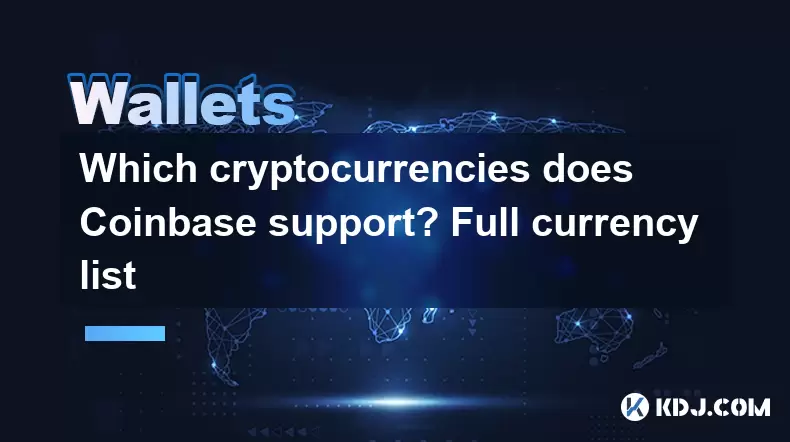
Which cryptocurrencies does Coinbase support? Full currency list
Jun 28,2025 at 08:36am
Overview of Cryptocurrencies Supported by CoinbaseCoinbase is one of the most popular and trusted cryptocurrency exchanges globally. It provides users with a platform to buy, sell, trade, and store various digital assets. As of the latest updates, Coinbase supports over 200 cryptocurrencies, including major ones like Bitcoin (BTC), Ethereum (ETH), and L...
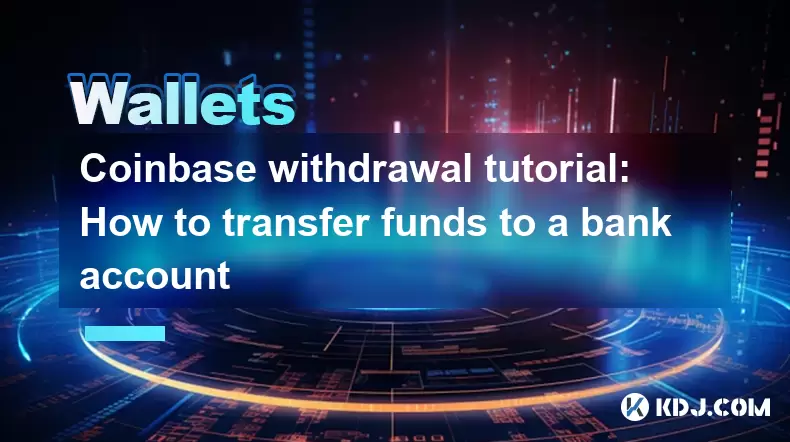
Coinbase withdrawal tutorial: How to transfer funds to a bank account
Jun 28,2025 at 02:35am
Understanding Coinbase WithdrawalsCoinbase is one of the most widely used cryptocurrency platforms, allowing users to buy, sell, and store digital assets. Once you've successfully traded or held your crypto on Coinbase, the next logical step may be to withdraw funds to a bank account. This process involves converting your cryptocurrency into fiat curren...
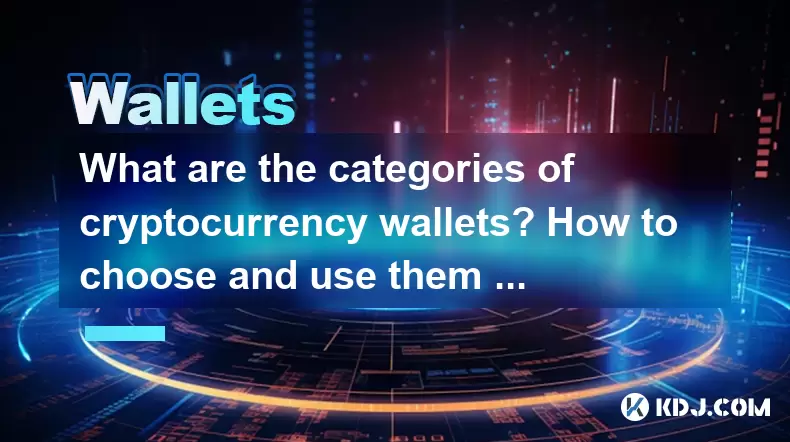
What are the categories of cryptocurrency wallets? How to choose and use them safely?
Jun 21,2025 at 10:42pm
Understanding Cryptocurrency WalletsCryptocurrency wallets are essential tools for anyone involved in the digital asset ecosystem. They allow users to store, send, and receive cryptocurrencies securely. Unlike traditional wallets that hold physical money, crypto wallets manage cryptographic keys—private and public—which interact with blockchain networks...
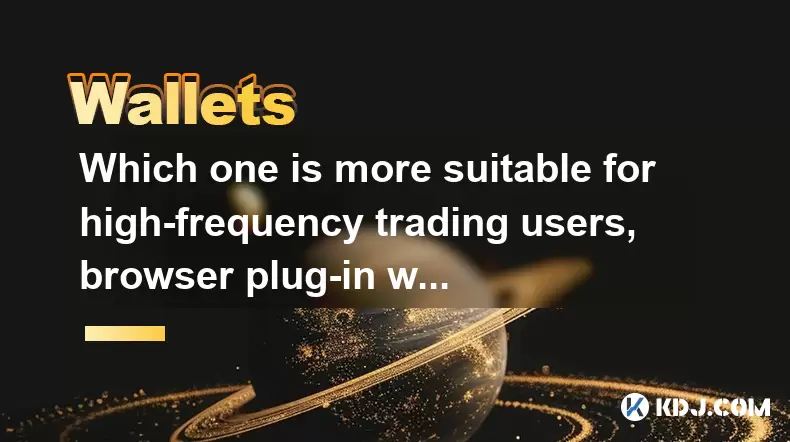
Which one is more suitable for high-frequency trading users, browser plug-in wallets or independent application wallets?
Jun 23,2025 at 08:22am
Understanding the Role of Wallets in High-Frequency TradingFor high-frequency trading (HFT) users in the cryptocurrency market, wallet selection is critical due to the need for speed, security, and seamless integration with trading platforms. HFT involves executing a large number of trades within seconds or even milliseconds, which demands a wallet that...

How to stake cryptocurrencies on Coinbase? Benefits and risks
Jun 27,2025 at 06:36pm
Understanding Cryptocurrency Staking on CoinbaseStaking cryptocurrencies involves locking up digital assets to support the operations of a blockchain network, typically in return for rewards. Coinbase, one of the most popular cryptocurrency exchanges globally, offers staking services for several proof-of-stake (PoS) coins. Users can stake their holdings...

How to contact Coinbase customer service? Support channels and response times
Jun 28,2025 at 01:29pm
Contacting Coinbase Customer Service: Support Channels and Response TimesIf you're a user of Coinbase, reaching their customer service team may become necessary for various reasons, such as account verification issues, transaction disputes, or technical difficulties. Understanding the different support channels available and what to expect in terms of r...

Which cryptocurrencies does Coinbase support? Full currency list
Jun 28,2025 at 08:36am
Overview of Cryptocurrencies Supported by CoinbaseCoinbase is one of the most popular and trusted cryptocurrency exchanges globally. It provides users with a platform to buy, sell, trade, and store various digital assets. As of the latest updates, Coinbase supports over 200 cryptocurrencies, including major ones like Bitcoin (BTC), Ethereum (ETH), and L...

Coinbase withdrawal tutorial: How to transfer funds to a bank account
Jun 28,2025 at 02:35am
Understanding Coinbase WithdrawalsCoinbase is one of the most widely used cryptocurrency platforms, allowing users to buy, sell, and store digital assets. Once you've successfully traded or held your crypto on Coinbase, the next logical step may be to withdraw funds to a bank account. This process involves converting your cryptocurrency into fiat curren...

What are the categories of cryptocurrency wallets? How to choose and use them safely?
Jun 21,2025 at 10:42pm
Understanding Cryptocurrency WalletsCryptocurrency wallets are essential tools for anyone involved in the digital asset ecosystem. They allow users to store, send, and receive cryptocurrencies securely. Unlike traditional wallets that hold physical money, crypto wallets manage cryptographic keys—private and public—which interact with blockchain networks...

Which one is more suitable for high-frequency trading users, browser plug-in wallets or independent application wallets?
Jun 23,2025 at 08:22am
Understanding the Role of Wallets in High-Frequency TradingFor high-frequency trading (HFT) users in the cryptocurrency market, wallet selection is critical due to the need for speed, security, and seamless integration with trading platforms. HFT involves executing a large number of trades within seconds or even milliseconds, which demands a wallet that...
See all articles
























































































